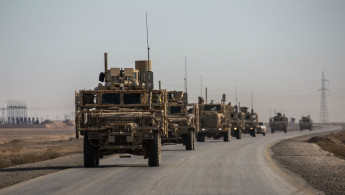Attacks on US in Iraq becoming dangerous cycle: experts
A truck reduced to twisted metal lies beside a blast-shattered mosque, after the latest pro-Iranian attack against US interests in Iraq, which experts warn is far from the last.
"The whole neighbourhood was damaged, houses burned, windows broken," said resident Hamza Abdulrazzaq, his head wrapped in a bandage.
He was wounded by one of the rockets, which landed in a town near the vast Ain Al-Assad airbase.
"The government should protect us," he added. "Why should we always pay the price?"
There have been attacks before on the base in Iraq's desert province of Anbar, which hosts troops from the US-led coalition against the Islamic State group.
But this operation was bigger than previous ones.
Iraqi General Hamad Namess said a total of 24 rockets were fired on Tuesday, from a truck transporting flour.
"The vehicle had all the necessary authorisations to cross the checkpoints," he told journalists Thursday, speaking at the site of the attacks.
Fourteen of the projectiles hit their target, causing minor injuries to two personnel on the base, according to the coalition.
Playing with fire
Iraq, long an arena for bitter rivalry between the US and Iran despite their shared enmity towards IS, has seen growing numbers of rocket and drone attacks on American targets in recent months.
The last few days have seen repeated attacks on US interests in the west, Iraqi Kurdistan in the north and the US embassy in Baghdad.
Some have been claimed by previously unknown groups demanding the departure of the "American occupier", or promising to avenge the deaths of comrades killed in US strikes.
But observers blame them on existing pro-Iranian factions, operating under the umbrella of the Hashed Al-Shaabi paramilitary alliance formed to fight IS.
Commanders from the Hashed, which is integrated into state forces and has become a major political player, often praise the attacks - without ever claiming responsibility.
The Hashed has vowed revenge for the deaths of its forces in US strikes in Iraq and Syria.
Experts warn that, even if neither side wants the conflict to escalate, the attacks have turned into a dangerous tit-for-tat violence.
One senior military official warned that Iraqi armed groups "are playing with fire".
Cycle to continue
"We can expect the cycle to continue", said Marsin Alshamary, an Iraq specialist at the Brookings Institution, a Washington-based think-tank.
Pro-Iranian forces have carried out dozens of attacks against US interests in Iraq since the start of the year, mainly as shows of force.
Iraq researcher Hamdi Malik of the Washington Institute said recent attacks by Iran-backed militias in Iraq and Eastern Syria was a way of bolstering support.
Pro-Iranian groups suffered a heavy blow in January last year with the US killing of Iran's revered commander Qasem Soleimani and his Iraqi lieutenant Abu Mahdi al-Muhandis.
"By not acting when more of their people are killed, (pro-Iran groups) risk losing their credibility and legitimacy in the eyes of their own bases," Malik said.
They are also cautious of "losing respect in the eyes of other components of the 'axis of resistance' in other countries in the region," he said, referring to pro-Iranian forces in Syria, Lebanon and Yemen.
On the other side, Washington "is trying to curb the influence and the authority of these militias," said Alshamary.
The Iraqi state has repeatedly condemned the rocket and drone attacks, but has been unable to put any of the perpetrators on trial, Alshamary said.
Such incidents have escalated in Iraq and Syria even as the US and Iran conduct delicate negotiations aimed at reviving a 2015 accord on Tehran's nuclear activities, scuppered by the Trump administration in 2018.





 Follow the Middle East's top stories in English at The New Arab on Google News
Follow the Middle East's top stories in English at The New Arab on Google News


